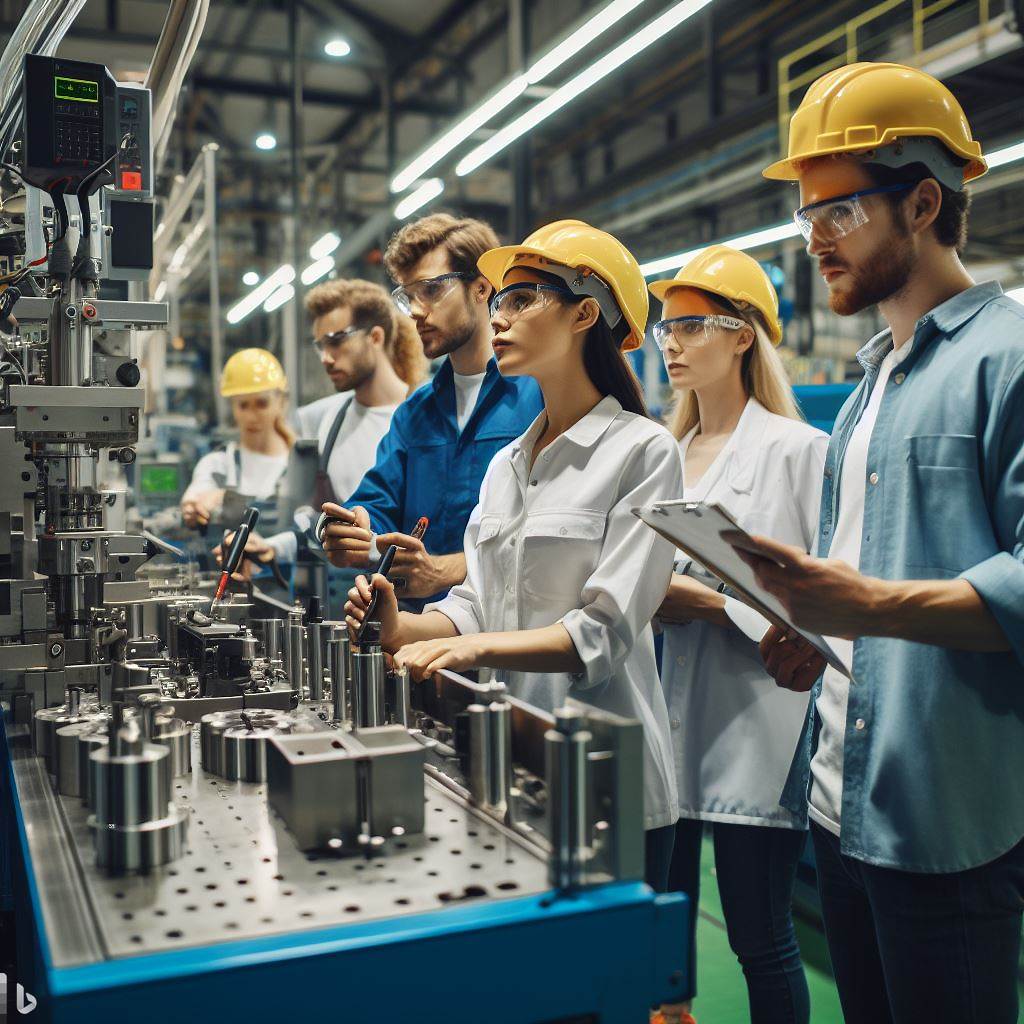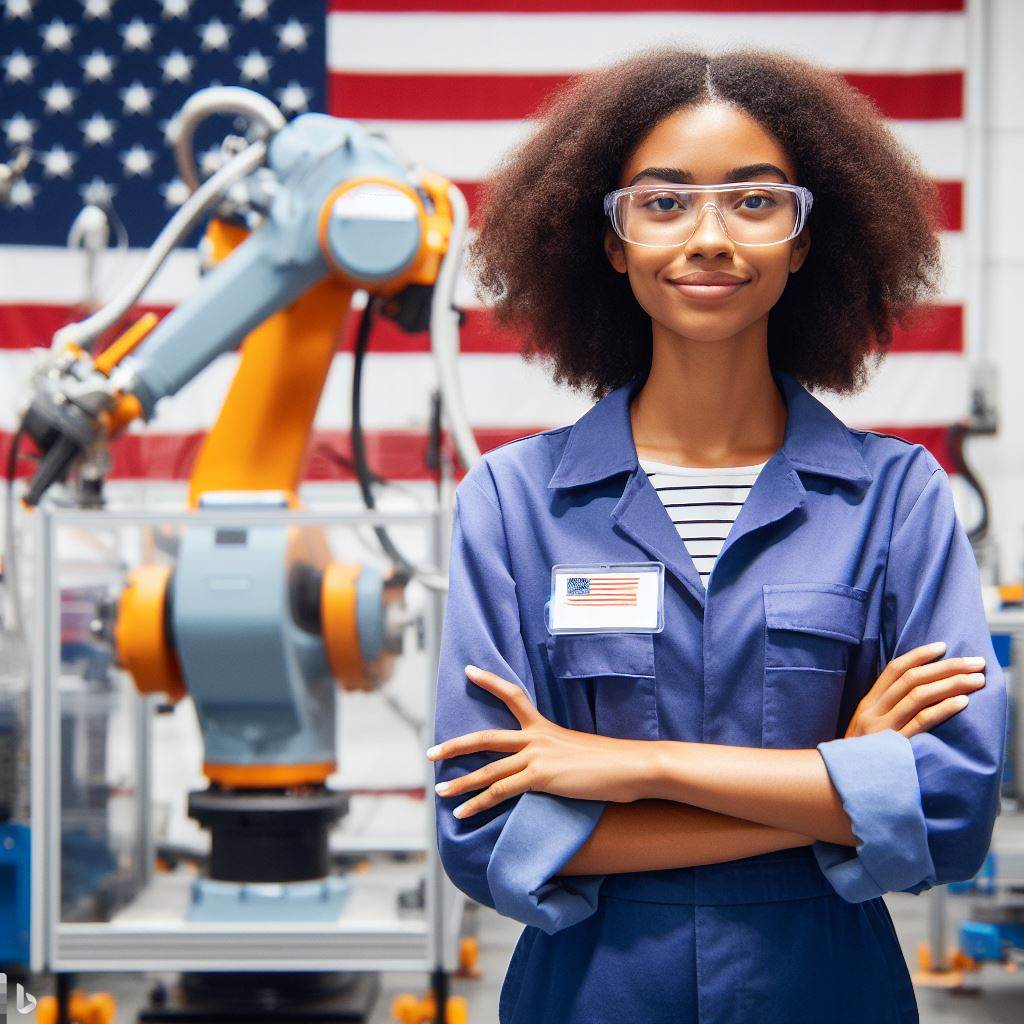Introduction
Mechanical engineers play a role in sustainable US manufacturing.
Sustainable U.S. manufacturing is the practice of producing goods in an environmentally responsible, socially equitable, and economically viable manner.
It aims to minimize waste, reduce energy consumption, and promote ethical labor practices.
The importance of sustainable manufacturing in the U.S.
- Reduces environmental impact: Sustainable manufacturing minimizes resource depletion and pollution, safeguarding the planet.
- Supports local economies: It bolsters the U.S. job market and fosters economic resilience.
- Enhances competitiveness: Sustainable practices drive innovation and efficiency, giving businesses a competitive edge.
- Meets consumer demands: An environmentally conscious consumer base seeks eco-friendly products.
- Regulatory compliance: Sustainable manufacturing aligns with stringent environmental regulations, reducing legal risks.
Purpose of the blog post
This blog post explores the pivotal role of mechanical engineers in advancing sustainable U.S. manufacturing, emphasizing their contributions to environmental conservation, economic growth, and technological progress.
Overview of Mechanical Engineering
Definition and scope of mechanical engineering
- Mechanical engineering is a branch of engineering that deals with the design, construction, and maintenance of mechanical systems.
- It involves the application of principles from physics, mathematics, and materials science to create useful products and technologies.
- The scope of mechanical engineering is broad, covering areas such as thermodynamics, fluid mechanics, materials science, and robotics.
Various areas of expertise within mechanical engineering
- Mechanical engineers can specialize in various fields, including automotive engineering, aerospace engineering, and renewable energy systems.
- Automotive engineering focuses on the design and development of vehicles, including engines, transmissions, and suspension systems.
- Aerospace engineering deals with the design and construction of aircraft and spacecraft, including propulsion systems and aerodynamics.
- Renewable energy systems involve the design and optimization of technologies such as wind turbines, solar panels, and biofuel production.
Role of mechanical engineers in different industries
- In the manufacturing industry, mechanical engineers play a crucial role in designing and developing efficient production processes and equipment.
- They are responsible for improving energy efficiency, reducing waste, and implementing sustainable practices.
- In the automotive industry, mechanical engineers contribute to the development of fuel-efficient vehicles and emission control systems.
- In the aerospace industry, mechanical engineers work on designing lightweight structures, efficient propulsion systems, and aerodynamic designs.
- Mechanical engineers also have a role in the energy sector, working on the development of renewable energy technologies and improving energy storage systems.
- They are involved in the design and maintenance of power plants, focusing on improving efficiency and minimizing environmental impact.
- In the biomedical field, mechanical engineers contribute to the design and development of medical devices, prosthetics, and rehabilitation equipment.
- Their expertise ensures the safety, reliability, and functionality of these devices.
- Mechanical engineers also play a role in the construction industry, working on the design and analysis of building systems, HVAC systems, and energy-efficient structures.
- They contribute to the sustainability of buildings by optimizing energy usage and incorporating renewable energy sources.
In essence, mechanical engineering is a diverse and vital field that plays a significant role in various industries.
From designing sustainable manufacturing processes to developing renewable energy technologies, mechanical engineers are at the forefront of creating a more sustainable future for U.S. manufacturing.
Their expertise and innovation drive advancements in efficiency, resource conservation, and environmental responsibility.
Read: Salary & Compensation: Civil Engineers in the USA

Importance of Mechanical Engineers in Sustainable U.S. Manufacturing
The role of mechanical engineers in sustainable U.S. manufacturing cannot be overstated.
As industries strive to minimize their environmental impact and promote responsible production practices, mechanical engineers are at the forefront of designing and implementing sustainable processes and systems.
Designing sustainable processes and systems
One of the key responsibilities of mechanical engineers is to analyze energy efficiency and environmental impacts within manufacturing processes.
By meticulously assessing every aspect of a system, they can identify areas of improvement and develop strategies to reduce energy consumption and minimize adverse environmental effects.
This includes finding ways to optimize the use of resources and minimize waste generation.
Promoting renewable and clean energy solutions
Additionally, mechanical engineers are instrumental in promoting renewable and clean energy solutions within manufacturing facilities.
They play a vital role in the implementation of solar, wind, or hydro-powered systems, leveraging these renewable sources to reduce reliance on traditional energy sources.
Furthermore, they focus on developing efficient energy storage and distribution systems to ensure maximum utilization of renewable energy and minimize reliance on nonrenewable resources.
Integrating sustainable materials and technologies
In line with the goal of sustainability, mechanical engineers also integrate the use of sustainable materials and technologies in manufacturing processes.
By exploring lightweight and eco-friendly materials, they strive to reduce the overall environmental impact of products.
Additionally, they adopt advanced manufacturing techniques, such as additive manufacturing or 3D printing, to enhance efficiency and minimize waste.
Overall, mechanical engineers play a critical role in driving sustainable U.S. manufacturing.
Their expertise in designing sustainable processes, promoting renewable energy solutions, and integrating sustainable materials and technologies is essential for industries to transition towards more eco-friendly practices.
By embracing sustainability, mechanical engineers contribute to the long-term viability of manufacturing industries, ensuring a greener and more sustainable future.
Read: Understanding the US Infrastructure: A Civil Engineer‘s View
Delve into the Subject: Wind Turbine Technician vs. Wind Engineer
Contributions of Mechanical Engineers in Sustainable U.S. Manufacturing
Developing innovative manufacturing processes
Mechanical engineers bring innovation and efficiency to sustainable U.S. manufacturing processes.
By developing and implementing innovative manufacturing techniques, they contribute to reducing environmental impact and increasing productivity.
Automation and robotics play a vital role in achieving these goals, as they streamline production processes and minimize human error.
Mechanical engineers drive the adoption of automation and robotics, ensuring that manufacturers optimize their operations while minimizing resource consumption.
Improving product design and life cycle assessment
In addition to improving manufacturing processes, mechanical engineers also focus on product design and life cycle assessment.
They emphasize product durability and reparability, promoting the use of materials and components that can be easily maintained and repaired.
By enhancing product lifespan, mechanical engineers help reduce waste and the consumption of natural resources.
They also evaluate the environmental impact of products throughout their entire life cycle, considering factors such as resource extraction, manufacturing emissions, transportation, and disposal.
This comprehensive assessment allows them to identify areas for improvement and make sustainable choices throughout the product’s life cycle.
Collaborating with interdisciplinary teams
Collaboration is essential in achieving sustainable U.S. manufacturing, and mechanical engineers are at the forefront of interdisciplinary teamwork.
They work closely with environmental scientists to understand the ecological impact of manufacturing processes and develop strategies for improvement.
Industrial designers collaborate with mechanical engineers to ensure that product designs align with sustainability goals, emphasizing eco-friendly materials and efficient manufacturing techniques.
Business professionals provide valuable insights into market demands, ensuring that sustainable practices are economically viable.
By collaborating with these diverse teams, mechanical engineers ensure that sustainability is integrated into every aspect of manufacturing.
In review, the contributions of mechanical engineers in sustainable U.S. manufacturing are essential.
They drive innovation in manufacturing processes through the implementation of automation and robotics, reducing both production time and costs.
Mechanical engineers also prioritize product design and life cycle assessment, improving durability, and reparability, and analyzing the environmental impact from start to finish.
Collaboration with interdisciplinary teams ensures that sustainability is integrated into all stages of manufacturing.
With their expertise and dedication, mechanical engineers play a pivotal role in advancing sustainable manufacturing practices in the United States.
Read: Career Paths & Progression for Civil Engineers in the USA
You Might Also Like: Mechanical Engineer vs. Mechatronics: U.S. Career Insights
Challenges Faced by Mechanical Engineers in Sustainable U.S. Manufacturing
Sustainability with profitability
Mechanical engineers play a crucial role in finding ways to make manufacturing processes sustainable while ensuring profitability for companies.
They must strike a delicate balance between environmental responsibility and economic viability.
Rapidly evolving technologies and regulations
Mechanical engineers face the challenge of keeping up with constantly evolving technologies and regulations in sustainable manufacturing.
They must stay updated on the latest advancements to develop innovative solutions.
Transform Your Career Today
Unlock a personalized career strategy that drives real results. Get tailored advice and a roadmap designed just for you.
Start NowResistance to change from stakeholders
Mechanical engineers often face resistance to change from various stakeholders including management, employees, and even customers.
They must devise strategies to convince and educate these parties about the importance of sustainable manufacturing practices.
Resource limitations and supply chain complexities
Mechanical engineers in sustainable manufacturing need to tackle the complexities of limited resources and complex supply chains.
They must find ways to optimize resource usage and design efficient supply chain systems.
Read: The Importance of Continuing Education for US Civil Engineers
You Might Also Like: Challenges Faced by Petroleum Engineers Today
Conclusion
A recap of the role of mechanical engineers in sustainable U.S. manufacturing
Mechanical engineers play a crucial role in sustainable U.S. manufacturing by designing and optimizing energy-efficient systems, improving manufacturing processes, and developing eco-friendly materials.
The importance of continuing to drive sustainability in manufacturing
Continuing to drive sustainability in manufacturing is vital for reducing environmental impact, conserving resources, and ensuring long-term economic competitiveness.
Encouragement for aspiring mechanical engineers to contribute to sustainable practices in the industry
Aspiring mechanical engineers should embrace sustainable practices from the beginning of their careers and actively seek opportunities to innovate and improve sustainable manufacturing processes.
[E-Books for Sale]
The Big Book of 500 High-Paying Jobs in America: Unlock Your Earning Potential
$19.99 • 500 High-Paying Jobs • 330 pages
Explore 500 high-paying jobs in America and learn how to boost your career, earn more, and achieve success!
See All 500 High-Paying Jobs of this E-Book
1001 Professions Without a Degree: High-Paying American Jobs You Can Start Now
$19.99 • 1001 Professions Without a Degree • 174 pages
Discover 1001 high-paying jobs without a degree! Unlock career tips, skills, and success strategies for just $19.99!




